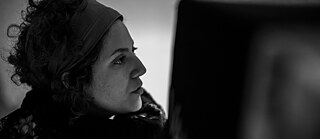Narges Kalhor “Only artists are able to speed up the wheel”

© Marco Müller
The Iranian filmmaker Narges Kalhor speaks in this interview about her film studies in Munich, elitism in the arts and how art can make the wheels of society turn more quickly.
Narges Kalhor, you studied at the Hochschule für Fernsehen und Film in Munich (HFF Munich). Is there an anecdote from your course that you remember in particular?Although I had already studied at the Teheran Film Academy, I had to repeat many compulsory courses during my studies at the HFF Munich. My course and my abilities were actually not recognised at the HFF. There was a case when I was accused during the oral examination of having learned film-technological texts in Persian instead of German, because I didn’t exactly know how much of the text was in German! But I have to say that there was a professor in the documentary film department in the same building who had a very positive influence on my life in Germany, my knowledge and the way in which I make films. I will be grateful for this for the rest of my life.
You have lived in Germany since 2009. What especially do you miss about Iran?
Cheerfulness!
To what extent is artistic creativity a social practice that can mobilise the society or move it in a certain direction?
I regard it as being like a chain. An artist is a person who comes into the world in a society, is influenced by this society, develops their art further and then influences other children who will also take up this art in the future. It is like a revolving chain, but only artists are able to speed up the wheel. If they do not receive the right input, they can always call themselves artists or whatever, but the wheel turns just as slowly if they also decide to do other professions in the society.
For decades many artists have been stuck with the cliché of being distracted intellectuals living in an abstract world. What’s your take on this statement and how would you describe your art?
I have also noticed this criticism in Germany. From my point of view, art/film/culture is unfortunately still the field for people who can afford to do it, who can manage to apply for art academies/universities in the first place and who manage it simply on financial grounds. If only people of a certain social class work in this field from generation to generation, then an elite level of art is created that has nothing to do with the majority of people in society or with reality. From the moment that diversity arrives in all fields, the artistic and intellectual movement gains a different significance and power for the society.
Some critics of socially engaged artists maintain that social engagement diminishes that true artistic value of the work and reduces it to “propaganda”. Have you experienced this yourself and how would you react to it?
This follows on from the previous question. It’s about the perspectives from which you see art. To the extent that art celebrates itself in its bubble and doesn’t have anything to do with people on the street, it may also criticise other artists from other societies in the way you describe. In my naively simple German, my answer is: art comes from pain. If it doesn’t experience this, art cannot penetrate deep into the heart of the person observing it. And socially engaged artists are those who are prepared to do this and who try to feel the pain.
How do you manage the balancing act of art as aesthetic work on the one hand, and art as a medium for a political statement on the other? Is it even possible to achieve this kind of balance?
Yes, of course it is possible. And we are here above all to make it possible. That is our task. Being apolitical today still means being political. I have been working in the field of experimental and essay film for a long time. I am still working on it and am searching for a new visual language and aesthetic in my films. It’s a never-ending journey. I am sure that in the field of cinema, there are many kinds of film that we haven’t even tried out yet.
Women are playing a decisive role in the current protests in Iran. To what extent does art also have an emancipatory function in your opinion?
I can say something briefly about the film scene. There were always many filmmakers who got arrested, and even now, many more have been arrested. This shows me how important their role was in supporting this women’s revolution with moving images. As I already said, it is like a chain, and this motor speeds up the madness of change in Iranian society.
Many female artists are also engaged in supporting the protesters in Iran. What role can artists and institutions in Germany play in this context?
If you as an artist feel yourself to be a part of society, then this resistance supports your conception of yourself. We are many creative artists, filmmakers and cultural professionals within and outside Iran who naturally support this revolution with our work without payment, contract, obligation or mandate. But this should also be the case in Germany, right?! Why does it not go beyond the purely symbolic action (such as cutting off hair) for many German artists? Basically, a political stance is lacking. From my point of view, artists and institutions can only play a major role if they engage with the current topics in the right way and make these their agenda, even without an external mandate.
0 0 Comments